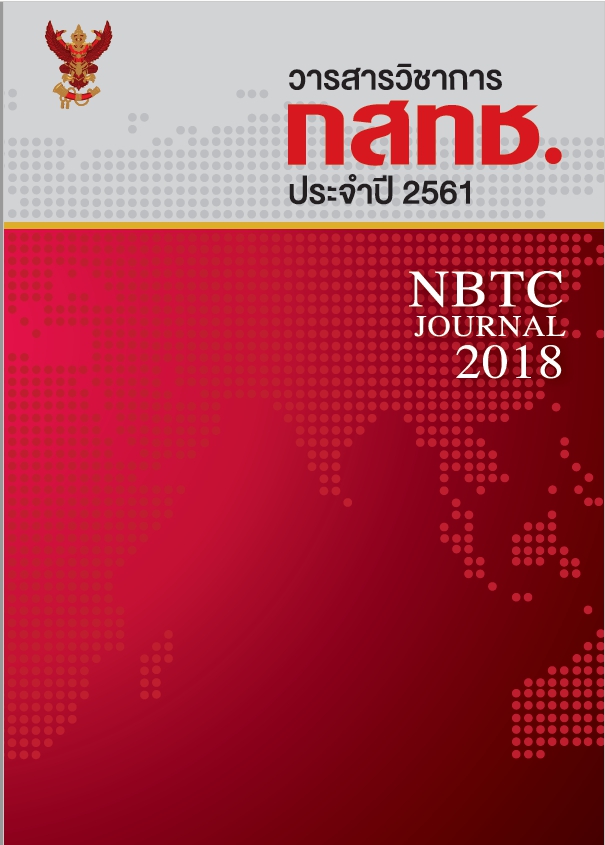Development of Radio Broadcasting in Thailand: Past, Present, and Future Development Direction
Main Article Content
Abstract
Thailand’s radio broadcasting was originated on the purpose of being benefits and advantages for governmental power since its first emergence. After that, it was passed from the governmental organizations to the private segments. Thailand’s constitution in 1997 and 2007 were stated to correct this situation with the written part, “The wavelength of radio frequency is the national communicative resource and is for the public benefits”. According to this, the public segments referred this statement and set up their own radio stations – more than 6,629 in number. Later on, NBTC was established and publicized the announcement in 2012 – to register all the qualified radio station owners and publish the 1-year license for their trial broadcasting. Although, this solution had been manipulated, the problems still occur, and proved academically. Radio broadcasting is still used in the political conflicts, and power exercising. The declining of permission for community radio license, the anonymity of the capital funding, the instability of the trial broadcasting license status, the quality of on-aired content, and the over-property, or against-the-law, products advertisements which affects the audiences are the problems to this situation. Significantly, they connect together as the large circuit; the entrepreneur – regulating organization – government – and public segment.
Policy recommendations;
The mentioned situation and the proved academic knowledge suggested that the regulation for the broadcasting business is the challenging confrontation for NBTC. The author aimed to state the recommendations for both policy and strategy, and for complying to be the framework in the broadcasting business and stakeholders in 6 points as follows; (1) NBTC should proceed and update the criteria for the license and terminate the “trial license”, and change to the formal business license which fit to the current situations, laws and regulations (maximum duration for 7 years) – in order to create the practical entire radio stations rearrangement. (2) Encourage the organization to set the standard for “Qualified Radio Station”, and place the same standard to be the evaluation criteria to get the results for the next license extending consideration. (3)The organization should set up the committee – in province level – to consider the license documentation which fits to the demands of the locals and communities. (4) Proceed the frequencies returning – whole or partially, and rearrange with the auction method for the business service
entrepreneurs, with the condition regarding the revenue from the auction will be transferred to support the public service business. (5)Proceed the supports for the settlement of the community service radio stations, and the prototype of public service – to be the center for knowledge about public beneficial radio business in all provinces. And, (6) Encourage and support the volunteer public network to monitor the improper content for the under-government, or the governmental affairs, 524 stations at present. Moreover, there is the coverage from the command of National Council for Peace and Order (NCPO) that makes the frequency free from any measurement for a while. In nearly future, the initiative measurements will be needed to determine the right measurements with the collaborative organizations to generate the precise roadmap for the broadcasting business.
Article Details
เนื้อหาหรือบทความที่ปรากฏในวารสารวิชาการ กสทช. เป็นลิขสิทธิ์ของสำนักงานคณะกรรมการกิจการกระจายเสียง กิจการโทรทัศน์ และกิจการโทรคมนาคมแห่งชาติ
(สำนักงาน กสทช.) ซึ่งสำนักงาน กสทช. ขอสงวนสิทธิ์มิให้นำเนื้อหา ข้อความ หรือบทความไม่ว่าทั้งหมดหรือส่วนหนึ่งส่วนใดไปเผยแพร่ คัดลอก หรือตีพิมพ์ซ้ำโดยเด็ดขาด
เว้นแต่ได้รับอนุญาตเป็นลายลักษณ์อักษร ทั้งนี้ ข้อความ หรือความคิดเห็นที่ปรากฏในบทความแต่ละเรื่องที่ตีพิมพ์ในวารสารนี้ เป็นความคิดเห็นของผู้เขียน
ไม่ผูกพันต่อคณะกรรมการกิจการกระจายเสียง กิจการโทรทัศน์ และกิจการโทรคมนาคมแห่งชาติ (กสทช.) และสำนักงาน กสทช. รวมทั้งกรณีหากมี
การละเมิดสิทธิ์ถือเป็นความรับผิดชอบของผู้เขียนโดยตรงไม่เกี่ยวข้องกับสำนักงาน กสทช. แต่ประการใด
References
เจริญ เพ็งมูล. (2558). วิทยุชุมชนกับการพัฒนาการเมืองท้องถิ่น, วารสารการบริหารท้องถิ่น ปีที่ 8 ฉบับที่ 2 เมษายน-มิถุนายน
, สืบค้นจาก https://www.tci-thaijo.org
ธนกร ศรีสุขใส. (2549). เศรษฐศาสตร์การเมืองของสื่อสารมวลชน :ศึกษากรณีการจัดสรรคลื่นวิทยุ ระบบเอฟ เอ็ม หลังการประกาศ
ใช้รัฐธรรมนูญ 2540. (วิทยานิพนธ์ปริญญาศิลปศาสตร์ มหาบัณฑิต).จุฬาลงกรณ์มหาวิทยาลัย.
พีระพงษ์ มานะกิจ. (2560). ปรัชญาแนวคิดเชิงเศรษฐศาสตร์การเมืองกับการกำกับดูแลผังรายการและเนื้อหา วารสาร NBTC
Journal, สืบค้นจาก https://www.tci-thaijo.org
รัฐธรรมนูญ (2560). ราชกิจจานุเบกษา. (2560). เล่ม 134 ตอนที่ 40 ก (6 เมษายน 2560).
รัฐธรรมนูญ. (2540). ราชกิจจานุเบกษา. (2540). เล่ม 114 ตอนที่ 55 ก (11 ตุลาคม 2540).
รัตติยา อังกุลานนท์. (2561, 3 พฤศจิกายน). วิทยุไม่ตาย คนฟังย้ายช่องทาง. กรุงเทพธุรกิจ. สืบค้นเมื่อ 3 พฤศจิกาย2561.
ประชาชาติธุรกิจออนไลน์. (2561, 10 กุมภาพันธ์). ทีวีดิจิทัล-วิทยุปี 60 ช่องใหม่ เบียดรายเก่าชิงโฆษณา. กรุงเทพธุรกิจ.
สืบค้นเมื่อ 3 พฤศจิกายน 2561.
อุบลรัตน์ ศิริยุวศักดิ์ (2544). ระบบวิทยุและโทรทัศน์ โครงสร้างทางเศรษฐกิจการเมืองและผลกระทบต่อสิทธิ เสรีภาพ. กรุงเทพฯ:
จุฬาลงกรณ์มหาวิทยาลัย.
Passau university. (2558). รูปแบบและเนื้อหาของสื่อแพร่ภาพกระจายเสียงในการเอาชนะการแบ่งขั้วในสังคมที่แบ่งแยก.
สืบค้นจาก http://www.broadcast.mbtc.go.th

